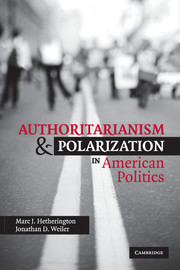Book contents
- Frontmatter
- Contents
- Acknowledgments
- 1 Spanking or Time Out: A Clash of Worldviews?
- 2 Putting Polarization in Perspective
- 3 Authoritarianism and Nonauthoritarianism: Concepts and Measures
- 4 A Historical Account of the Roots of Worldview Evolution
- 5 Authoritarianism's Structuring of Contemporary Issues
- 6 Threat and Authoritarianism: Polarization or Convergence
- 7 Evidence of Worldview Evolution
- 8 Immigration: A Reinforcing Cleavage that Now Constrains the Republican Party (GOP)
- 9 What the 2008 Democratic Nomination Struggle Reveals about Party Polarization
- 10 A New View of Polarization
- Epilogue
- Bibliography
- Index
2 - Putting Polarization in Perspective
Published online by Cambridge University Press: 05 June 2012
- Frontmatter
- Contents
- Acknowledgments
- 1 Spanking or Time Out: A Clash of Worldviews?
- 2 Putting Polarization in Perspective
- 3 Authoritarianism and Nonauthoritarianism: Concepts and Measures
- 4 A Historical Account of the Roots of Worldview Evolution
- 5 Authoritarianism's Structuring of Contemporary Issues
- 6 Threat and Authoritarianism: Polarization or Convergence
- 7 Evidence of Worldview Evolution
- 8 Immigration: A Reinforcing Cleavage that Now Constrains the Republican Party (GOP)
- 9 What the 2008 Democratic Nomination Struggle Reveals about Party Polarization
- 10 A New View of Polarization
- Epilogue
- Bibliography
- Index
Summary
In mid-2003, Rep. Bill Thomas (R-Calif.), chairman of the House Ways and Means Committee, attempted to rush a ninety-page pension reform bill through his committee. Not having had an opportunity to read the bill, the Democratic members fled the committee room to review the legislation in an adjacent library. An irate Thomas called for an immediate vote and passed the bill with only one Democrat, Representative Pete Stark (D-Calif.), still in the room. When Stark objected to Thomas's tactics, Representative Scott McInnis (R-Col.), a majority party committee member and Thomas ally, told Stark to “shut up.” The seventy-one-year-old Stark challenged McInnis, twenty-one years his junior, to “make him” shut up and then repeatedly called him a “little fruitcake.” Chairman Thomas took the unusual step of calling the Capitol Police to subdue Stark and eject the Democrats from the library. Although such a move was not unprecedented in the modern era, it was, to say the least, highly irregular. This is emblematic of the intense polarization that characterizes contemporary American politics.
There are many indications that American politics is now more sharply divided and more intensely conflicted than has typically been the case. A distinctly conservative Supreme Court decided the 2000 presidential election in favor of the conservative candidate who was the popular vote loser, causing Democrats much consternation and Republicans much exhilaration. Income inequality has reached its highest point since the United States started keeping such data in the 1940s (McCarty, Poole, and Rosenthal 2006), and class-based voting has become the most pronounced it has been in at least the last fifty years (Stonecash 2000; Bartels 2006).
- Type
- Chapter
- Information
- Authoritarianism and Polarization in American Politics , pp. 15 - 32Publisher: Cambridge University PressPrint publication year: 2009
- 1
- Cited by



